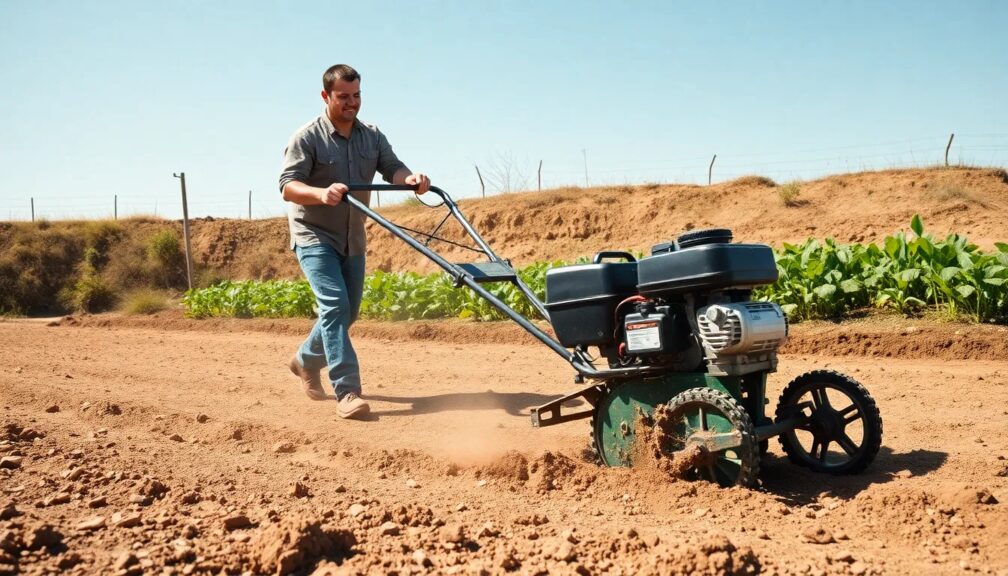Will a tiller work on hard soil

Bienvenido a este artículo sobre Will a tiller work on hard soil
Breaking up hard soil is a common challenge for gardeners and farmers alike, and the effectiveness of a tiller in these conditions is a topic of frequent discussion. This article will delve into the capabilities of tillers to transform compacted earth into workable soil. We'll explore various types of tillers, discuss how they operate on hardened soil, and provide tips for achieving the best results. Whether you're preparing a new garden bed or cultivating an existing plot, understanding the interaction between tillers and hard soil will help you choose the right approach for your land.
Will a tiller break up hard soil?
Unlocking the Secrets of the Earth, the answer is tantalizingly complex, yet straightforward. Imagine the transformation of your unyielding garden into a fertile haven, ripe for planting. It's not about sheer power; it's a symphony of precision, technique, and know-how.
Consider the type of tiller you're wielding. A front-tined tiller might dance across the compact surface, while a heavyweight rear-tined tiller digs deep, gnawing through clods of earth with relentless determination. But the true protagonist in this tale is the subsoil beast – the rototiller. Armed with brawny blades, it delves beneath the crust, churning the soil and bringing life-giving oxygen to its depths.
Yet, the intrigue deepens. The strategy of breaking ground doesn't simply end with machinery. The timing of your assault is key – striking after a soaking rain or harnessing the power of soil amendments could mean the difference between triumph and toil. And what about the long-term effects on soil structure and health? The plot thickens as we consider sustainable practices that keep the ground productive year after year.
Ready to uncover more? Brace yourself for a journey into the heart of soil dynamics, where each pass of the blades could spell a new beginning for your garden. The answer awaits, a mere read away, promising to quench your thirst for gardening success.
How to use a tiller on hard ground?
Transforming unyielding soil into a fertile bed for your garden may seem like a Herculean task, but with the right technique and a sturdy tiller, you'll breeze through the challenge. The secret to mastering this feat lies in understanding the mechanics and preparation required to make the soil more workable. You're about to discover a method that can revolutionize your gardening experience, ensuring that no patch of ground remains unconquered.
Before you tackle the hard ground, it's essential to prepare by ensuring your tiller is in top condition. Check the tines for sharpness and strength, as they will be the frontline soldiers in this battle with the earth. Dull tools lead to frustration and inefficiency—a scenario you want to avoid at all costs.
Next, you might think that the toughest setting on your tiller is the go-to option, but in fact, starting with a shallow pass is the key. This preliminary step loosens the top layer without straining your machine. It's like stretching before a marathon—it prepares the ground and the tiller for the intense work ahead.
The magic unfolds when you apply the golden rule of tilling: patience is a virtue. Rushing can lead to incomplete soil turnover and even damage to your tiller. Incremental depth adjustments paired with steady, methodical passes will gradually break up the dense soil, maintaining good tiller health and promoting thorough cultivation.
Curious about the results of this technique? The once formidable ground becomes a soft, nutrient-rich haven for your plants. It's a transformation you have to see to believe. And with the soil adequately aerated, your garden is now primed to flourish beyond your wildest expectations.
Ready to turn that daunting plot into a gardener's paradise? Stay tuned to unearth the full array of steps and tips that ensure your success in tilling hard ground. The journey from compacted to cultivated soil is just the beginning, and there's so much more to explore and learn. Your green thumb awaits its ultimate test, and now you have the know-how to pass with flying colors.
Which soil is difficult to till?
Navigating the world of gardening and agriculture, we often encounter the silent challenge beneath our feet: a soil type that defies the plow and spade with stubborn resolve. This particular soil holds secrets to both triumphant yields and heartbreaking toil, a paradox that only the most patient and persistent farmers dare to unravel.
Imagine the anticipation as you prepare to cultivate the land, only to find that the earth beneath is an enigmatic puzzle, a riddle that many have tried to solve but few have mastered. The difficulty of tilling this soil isn't just a minor inconvenience; it's a gatekeeper, a test of resolve for anyone who dreams of a bountiful harvest.
Are you curious yet? Feel that itch of intrigue? Here's the clincher: mastering this soil can mean the difference between a lush garden and a barren plot. It's not merely about physical labor; it's about understanding the intricate dance of soil composition, moisture levels, and seasonal timing.
Within these depths lies a matrix of clay, compacted and dense, that laughs in the face of your efforts. Clay soil, with its fine particles, can hold onto water like a vice, becoming almost concrete-like when dry. But before you despair, know that this is not the end of the story. The challenge of clay is a call to arms, a beckoning to unlock its potential.
Embarking on the journey to tame such a formidable opponent requires more than brute force; it demands strategy, finesse, and a dash of ingenuity. The path to success is lined with insights into soil amendment, the right tools, and the ideal timing—knowledge that can only be gained through experience or the wisdom of those who have walked this path before you.
Stay with us as we delve into the mysteries of this arduous terrain. Discover the techniques that transform this unyielding earth into a nursery for growth, and the tales of perseverance that turn a gardener into a steward of the land. Your green thumb is about to get a whole lot greener.
What is the easiest way to break up hard soil?
If you've ever faced the formidable challenge of transforming compacted dirt into a plant-ready paradise, you know it's not for the faint of heart. But before you throw in the trowel, consider that the secret to softening up that stubborn soil might just be at your fingertips.
Unlocking the potential of your garden starts with understanding the unique mix of strategies to penetrate, aerate, and enrich your earth. One game-changing approach involves the use of simple tools. From the reliable garden fork to the powerful rototiller, these instruments are your allies in the quest to revitalize your garden's foundation.
But the real intrigue lies in the alchemy of soil conditioners. Organic materials such as compost, aged manure, or leaf mold don't just loosen the grip of the ground; they breathe life into it, welcoming a thriving ecosystem that supports growth.
Now, imagine a garden where water seeps through the soil gracefully, where roots delve deep without resistance, and where every seed has a fighting chance to reach for the skies. We're talking about turning a barren plot into a flourishing oasis.
However, the ease and speed at which you can transform your soil are closely guarded secrets that only the most successful gardeners have mastered. But fear not, for we are on the verge of uncovering these time-honored techniques, methods that will not only revolutionize the way you garden but will also save your back and perhaps even your sanity.
Ready to delve deeper into a world where hard soil is but a mere memory? Where the only thing firmer than the ground is your resolve to conquer it? Stay tuned, as we are about to reveal the most effective ways to make even the toughest soil bow down to your green thumb.
Will a tiller work on hard soil reddit
Unlock the Secrets: Transforming Tough Terrain with a Tiller
Have you ever stared down at unyielding, hard-packed earth, wondering if your garden dreams would crumble like the dry clods beneath your feet? Well, hold onto your hats, because the answer to overcoming this gritty challenge might just lie within the robust world of tillers!
Tillers, those mighty warriors of the gardening arsenal, are often touted for their ability to break new ground, aerate compacted earth, and prepare the perfect seedbed. But when it comes to hard soil, even the most experienced gardeners can be left scratching their heads.
Here's the Scoop:
- The right tiller can transform your soil from concrete to cultivable, but it's not just about power - it's about technique.
- There are secrets to tilling that hard soil, and once you unlock them, you’ll watch your garden flourish.
- Speculation is rife, but real-world experiences shared by green-thumbed Redditors reveal the truth about tiller capabilities.
Imagine harnessing a machine that doesn't flinch at the sight of hard clay or rocky terrain. With the right tiller, you can do just that. But not all tillers are created equal. Discover the types that have gardeners buzzing and learn why some tillers end up as paperweights while others become the stuff of legend.
It's Not Just a Machine, It's a Movement
Dive into a world where soil type is king and the tiller is its scepter. Uncover the magic blend of features that will make your soil submit to your will. From tine configuration to engine torque, we're revealing the elements that make a tiller conquer hard soil without breaking a sweat - or a tine.
Ready to Revolutionize Your Garden?
Don't just take our word for it. Hear the tales, triumphs, and cautionary stories from the trenches. Gardeners have taken to Reddit to share their hard-won victories against the hardest of soils. Their stories will inspire you, guide you, and maybe even save you from a back-breaking defeat.
What are the best practices for prepping your ground before tilling? What about aftercare? We've got the inside scoop on how to nurture your soil post-till for optimal results. The anticipation is real – and the potential for your lush, bountiful garden is just a tiller away.
So, do you dare to transform your garden with a tiller? The knowledge is here, the tools are ready, and the community is waiting. The question remains: Are you?
Join the conversation, learn the tactics, and prepare to tackle that hard soil with confidence. Your dream garden is closer than you think, but you'll need to act quickly - after all, the best secrets don't stay buried for long.
Consejo final: Before tilling hard soil, make sure to moisten it by watering a day or two in advance which will make the process easier and more effective. Additionally, consider using a tiller designed for heavy-duty applications to ensure optimal results. Wishing you success in your gardening endeavors!
You may be interested in these other articles: What is an alternative to tilling
What is an alternative to tilling Should you loosen roots before planting
Should you loosen roots before planting Should you till compost into the soil
Should you till compost into the soil How do you loosen compacted soil without tilling
How do you loosen compacted soil without tilling How do I fix hard soil in my garden
How do I fix hard soil in my gardenIf you want to know more about similar articles like Will a tiller work on hard soil you can visit category Gardening Tools.